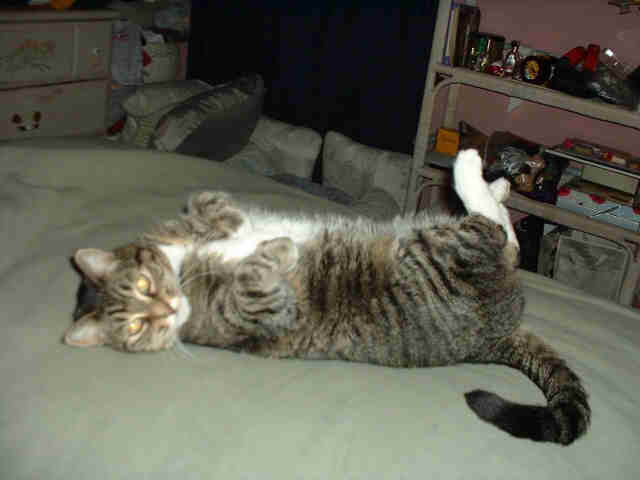Please Help Pets with a Small Donation of One Dollar
Diabetes in Cats
By: Dr. Jane Bicks
When dealing with diabetes in cats, top dietary management is required at all feeding levels!!
Veterinarian supervision is highly recommended.
When a cat's pancreas fails to produce adequate insulin, the hormone
necessary for proper metabolism and maintenance levels of blood sugar
(glucose), the result is an improper metabolism of carbohydrates, an
uncontrolled rise in blood sugar, and a disease called Diabetes Mellitus.
In cats, increased thirst and increased urine production are usually
symptoms owners notice first, and thankfully, rarely ignore.
Once a diagnosis is made and these cats are put on medication, a strict
diabetes management diet, or both, they can live long, happy, active lives.
There are various natural compounds which can effectively manage diabetes.
They must be prescribed by a veterinarian since they can radically decrease
your cat's insulin needs.
Call the American Holistic Veterinary Association to find a veterinarian in
your area. (410-569-0795)
Firm Feeding Rules for your Diabetic Cat
- In order to establish and maintain a correct insulin dosage,
you must feed the same amount of food with the same ingredients every day.
A fixed- formula food with quality protein, quality controlled processing,
high palatability, and a low carbohydrate content, is not an option - it's
a necessity!
- Supermarket foods are generally not fixed formulas, so a
professional/alternative food is necessary. Adding fiber will help
regulate your cat. Try 1/8 teaspoon of oat bran mixed with 1/8 teaspoon of
brewer's or torula yeast - start with a pinch, until you can work up to
1/4 teaspoon daily, or feed a high fiber food as recommended by your vet.
- Never make any dietary changes or additions without consulting
your vet. Although a diet with more fiber may be healthy for your cat (and
high fiber diets are), a switch could necessitate a reduction of the
animal's prescribed insulin dosage
- and that's a decision only your pet's doctor is qualified to make.
- Feed your cat twice daily, but only high-protein, low
carbohydrate, meals.
- Don't let your cat get fat. If his current food is making him
fat - adjust the amount. If he still continues to gain, then a diet food
is necessary.
- The cat's diet should be supplemented with 100 to 300 mg
vitamin C or an antioxidant formula.

Alfred Wants all his Feline Friends to be Aware of:
If you are looking for a very high quality food and supplement, one that
contains no chemical preservatives, does have antioxidants and an impressive
vitamin/mineral analysis, please take a few minutes and check out Alfred's
favorite Cat food:
Uncover what all Cats are Meowing About
Cat Fancy Magazine gave Life's Abundance cat food an award for being the best
quality cat food on the market! (Dec. 2002 Issue)
It's time you gave your precious kitty one of the finest dining experiences
they can have.
Purr-fectly natural
Purr-fectly Delicious!
A taste that cats just love.....and Soooo good for them too.
*******************************************
Diabetes is a serious illness.
Go to our Web site above.
Print out a list of ingredients in the food and daily supplement and then
take those lists to your vet. Ask your vet if it is okay to slowly introduce
the Life's Abundance food and Daily Supplement into your cat's diet.....if
your cat is on insulin, never change your cat's diet without first asking your
vet)
Miss Ginger Marie Kitty
